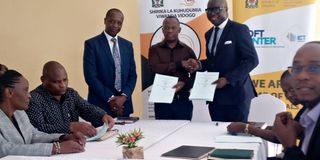New ICT incubation centres set to propel Tanzania’s youth innovation

ICT Commission director general, Dr Nkundwe Mwasaga (right) hands over to one of the regional SIDO managers a contract signed for the establishment of the ICT incubator centres in the country. The commission entered into an MoU with SIDO to help drive the country into digital economy status. PHOTO | COURTESY
What you need to know:
- The initiative aims to make Tanzania record significant strides towards its ambition to become a leading digital economy hub on the continent.
Dar es Salaam. The Information and Communication Technology Commission (ICTC) has inked agreements with six regions to establish ICT incubation centres, a move set to revolutionize the country’s digital landscape.
The initiative aims to make Tanzania record significant strides towards its ambition to become a leading digital economy hub on the continent.
The newly signed memorandum of understanding (MoU) with the Small Industries Development Organisation (SIDO) on Thursday, June 6, 2024, marks a pivotal step towards empowering Tanzanian youth and fostering home-grown digital innovation.
These centres are expected to be immediately constructed in the Dar es Salaam, Arusha, Mwanza, Mbeya, Lindi, and Tanga regions, as part of a comprehensive strategy to bolster the nation’s digital economy.
ICTC Director General Nkundwe Mwasaga emphasised the importance of the transformative potential of over Sh8 billion worth of initiative.
"Our goal is to fuel the nation's digital economy agenda by equipping young people with the skills and resources they need to create their own companies," said Dr. Mwasaga.
"This development is a significant milestone that will reach all regions, aiming to benefit young people who will significantly contribute to the growth of the digital economy and ICT industries in the country," he added.
ICTC partnership with SIDO, known for its extensive network of incubators and accelerators, is a strategic move to ensure broad and effective implementation.
"One of ICTC's responsibilities is to ensure that Tanzania develops a digital economy built by small youth-led companies. Hence, our relationship with SIDO is to complement each other in achieving this vision,” said Dr. Mwasaga.
The innovation centres, according to him, are designed not only to create system-based companies but also to facilitate the production of ICT devices.
"We have started with six centres, two of which will be dedicated to producing ICT products. This step aligns with the government's ambition to build a digital economy in Tanzania, defined by young companies," Dr Mwasaga highlighted.
With a youthful population where 33 percent are between the ages of 15 and 34, combined with increasing internet penetration and smartphone ownership, Tanzania is well-positioned to harness its human capital for digital innovation.
"We need to build these young people's innovative capabilities so that they can create companies that will generate employment for many youths and make the ICT sector significantly contribute to the national income," he noted.
The strategy also aims at leverage the African free market, enabling Tanzanian innovations to compete globally. Currently, many systems used in the country are imported, but this project will train the youth to develop local solutions, according to him.
Emphasising the need for technology localization, Dr Mwasaga said that with Kiswahili now recognised globally, the time was ripe for systems development using the national language.
SIDO’s Director General, Sylvester Mpanduji, echoed Dr Mwasaga’s sentiments, emphasising the need for the project's sustainability and its potential to reduce youth unemployment.
"This is a great opportunity for young people to be self-employed. The government will have a large group of youths able to pay taxes through their formalised innovations," he said.
SIDO regional managers shared their excitement and plans for the new centres with Mr Jalphary Donge from Arusha highlighting the dual focus of the centre in his region on innovation and technology device creation.
"We have many youths, something that forced us to sign agreements with four colleges. Through these centres, the youths will learn and become innovative to come up with products to address digital challenges existing in the community at large," he explained.
His counterpart from Lindi region, Ms Frida Mungulu, said the MoU has a significant role in encouraging youth to drive a digital economy revolution.
"Through this project, we aim to reduce youth unemployment by providing them with hands-on skills that every young person can acquire. Our role in establishing and developing small industries is to nurture the youths to be proficient," she said.
In 2022 alone, more than 2,166 students graduated in ICT fields, reflecting a growing skilled workforce ready to drive technological advancements.
With a 15 percent increase in the number of known startups and a 14.65 percent growth in startup employment in 2022, Tanzania's entrepreneurial spirit is thriving.





